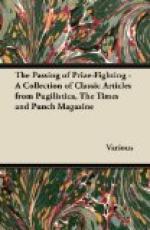READER.—Dreadful, soul perturbing suggestion! Go on, Mr. PUNCH.
PUNCH.—Not but what I think it—if their constitution will stand damp paper—an admirable way of rearing young princesses. Queen Elizabeth—my wife Judy was her wet nurse—was reared after that fashion.
READER.—David Hume says nothing of it.
PUNCH.—David Hume was one of the wonders of the earth—he was a lazy Scotchman; but had he searched the State Paper Office, he would have found the documents there—yes, the very Acts of Parliament—the very printed rollers. To those rollers Queen Elizabeth owed her knowledge of the English Constitution.
READER.—Explain—I can’t see how.
PUNCH.—Then you are very dull. Is not Parliament the assembled wisdom of the country?
READER.—By a fiction, Mr. PUNCH.
PUNCH—Very well, Mr. Reader; what’s all the world but a fiction? I say, the assembled wisdom; an Act of Parliament is the sifted wisdom of the wise—the essence of an essence. Very well; know you not the mystic, the medicinal effects of printer’s ink? The devil himself isn’t proof to a blister of printer’s ink. Well, you take an Act of Parliament—and what is it but the finest plaster of the finest brains—wet, reeking wet from the press. Eschewing diaper, you roll the Act round the royal infant; you roll it up and pin it in the conglomerated wisdom of the nation. Now, consider the tenderness of a baby’s cuticle; the pores are open, and a rapid and continual absorption takes place, so that long before the Royal infant cuts its first tooth, it has taken up into its system the whole body of the Statutes.
READER.—Might not some patriots object to the application of the wisdom of the country to so domestic a purpose?
PUNCH.—Such patriots are more squeamish than wise. Sir, how many grown up kings have we had, who have shown no more respect for the laws of the country, than if they had been swaddled in ’em?
READER.—Do you think your friend Sir Robert is for statute rollers?
PUNCH.—I can answer for Sir Robert on every point. His first attack before he kisses hands—and he has, as you perceive, been practising this half-hour—will be upon the women of the bedchamber. The war with China—the price of sugar—the corn-laws—the fourteen new Bishops about to be hatched—timber—cotton—a property tax, and the penny post—all these matters and persons are of secondary importance to this greater question—whether the female who hands the Queen her gown shall think Lord Melbourne a “very pretty fellow in his day;” or whether she shall believe my friend Sir Robert to be as great a conjuror as Roger Bacon or the Wizard of the North—if the lady can look upon O’Connell and not call for burnt feathers or scream for sal volatile; or if she really thinks the Pope to be a woman with a naughty name, clothed in most exceptionable scarlet. It is whether Lady Mary thinks black, or Lady Clementina




